Of all the places I’ve ever traveled to, Mostar in Bosnia and Herzegovina stole my heart. It all started when I saw photos of Stari Most, the “Old Bridge,” on Pinterest. From that moment, I knew I just had to go there, and naturally, added Bosnia to my future travel agenda. Finally, that trip happened. When I saw the bridge and the surrounding landscape for the very first time, it brought tears of joy to my eyes. I stopped breathing for a moment as I took it all in, as it was far more beautiful than I ever could’ve imagined.
Mostar has since remained one of my favourite places I’ve ever visited and I one of the top places I recommend people to visit.
The Countless Reasons To Visit Mostar, Bosnia And Herzegovina
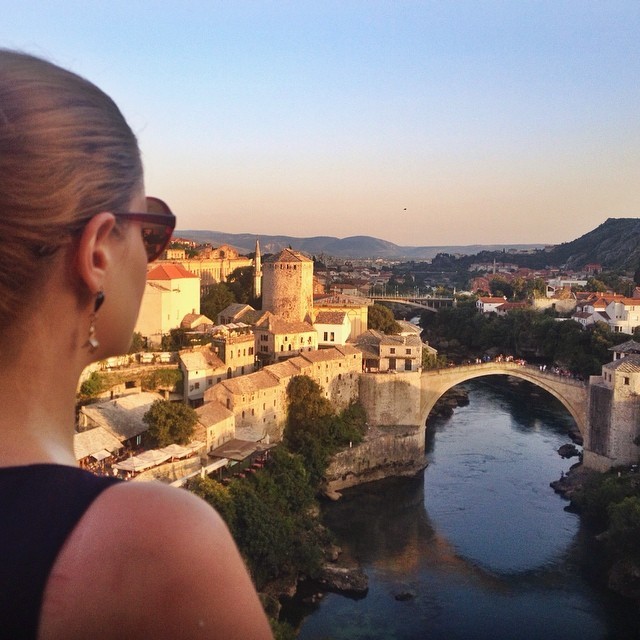
I’ll admit that Mostar took me by surprise. There is so much more to Mostar than the picture-perfect Old Bridge. From hiking through the nearby forested mountains to taking in holy sites, posing with weird and offbeat statues, walking through medieval towns, swimming under waterfalls, exploring abandoned ruins, and hunting down street art, I couldn’t help but wonder time and time again, why Mostar isn’t on more peoples’ travel radars. This special place deserves much more attention than it gets.
Here are my top reasons why you should plan to visit Mostar, Bosnia and Herzegovina.
1) Admire the stunning beauty of Stari Most
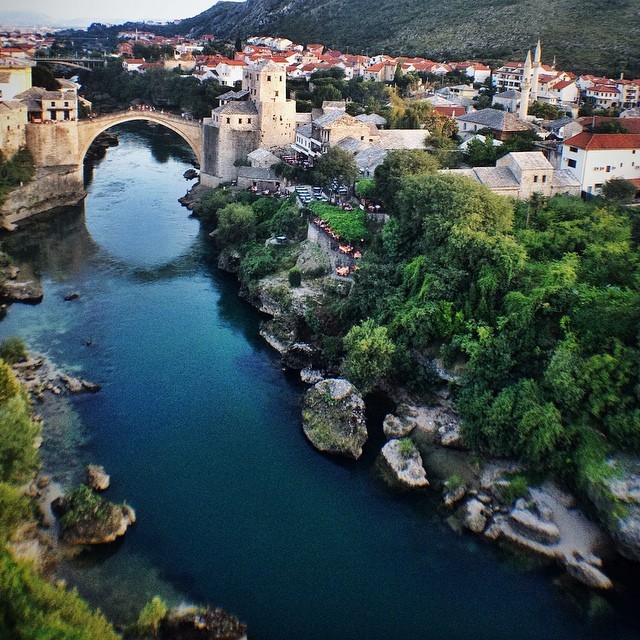
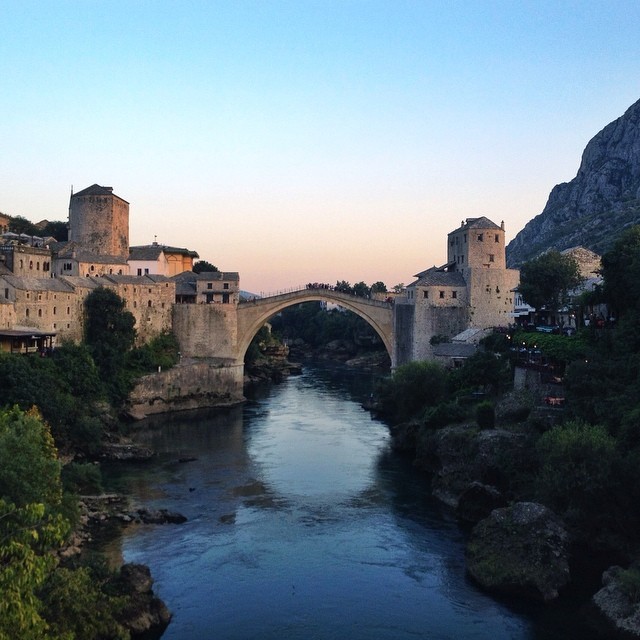
Let’s start with the most obvious reason you should visit Mostar and what brought me there in the first place.
Stari Most is a 16th-century, Ottoman-style bridge, and Mostar’s most notable architectural landmark. Stretching 28 meters across the Neretva River, it connects the two sides of the city. Stari Most proudly stood there for 427 years, until it was destroyed in 1993 during the Bosnian War. Thanks to post-war restoration efforts, a new bridge was built in 2004.
What’s good to know about Stari Most? Here are some of our top tips:
- The bridge is pretty steep and the surface is slippery. Even with the addition of small pieces of raised concrete to help, you’ll need sturdy footwear to make your way across the bridge without looking like a fool. It was a lesson I learned the hard way as my flip-flops simply didn’t suffice. Wear sneakers to avoid looking and feeling silly like I did.
2) Watch brave souls dive off the bridge
These days, tourists flock to the bridge to pose for sexy photos and to watch talented local men dive off the bridge, plunging 20 meters into the cold river below. The practice of diving off the bridge started back in 1664 and became a tradition for the young men of Mostar. In 1968, the city even held a formal diving competition, which continues today.
There are some important things that you need to keep in mind about bridge jumping in Mostar:
- Throughout the day, you’re likely to spot rather fit-looking men (perhaps wearing tight black Speedos) walking around collecting money. After a certain amount has been collected, you’ll get the extreme pleasure of watching one of them dive off the bridge.
- Do not attempt to jump off the bridge yourself. It’s dangerous and people have been injured and even died doing it. For you more adventurous (crazy?) souls out there, for about 20 €, you can receive “training” from locals who will teach you all you need to know about Stari Most bridge diving. You’ll even get a certificate for your successful dive, jump, or belly flop off the bridge.
- If you’re looking for an activity that’s more on the safe side, you can also go for a soak in the river. You’ll notice that just below the bridge, there’s a place where several people are gathered, tanning, and occasionally jumping into the river. No one seems to swim as the current’s fast and the water’s super chilly even on the hottest of summer days.
3) Check out Koski Mehmed Paša Mosque
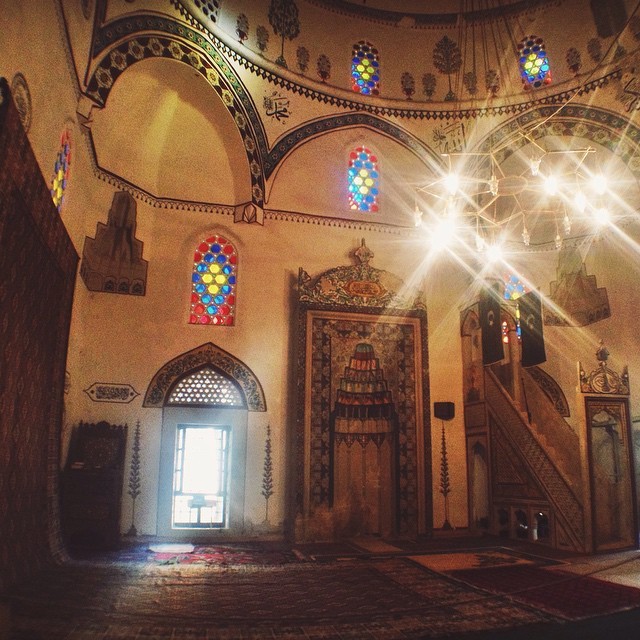
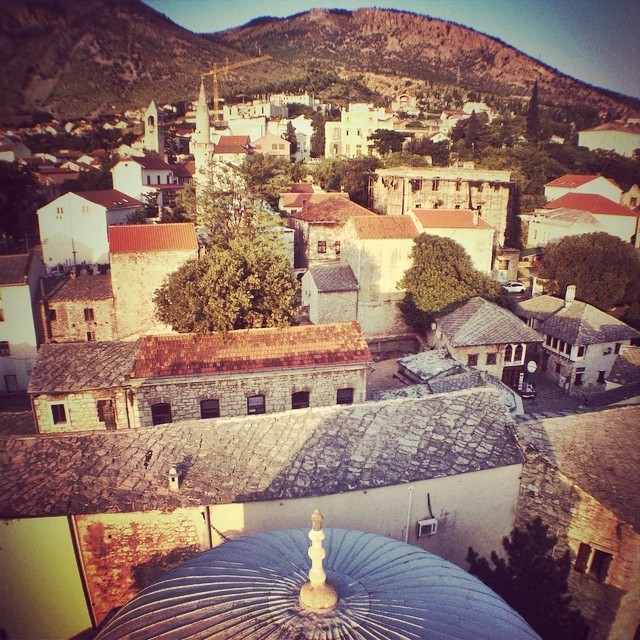
Constructed in 1618, Koski Mehmed Paša Mosque is a simple but pretty mosque. For a small fee, you can enter the mosque and even climb the very narrow winding staircase in the minaret for one heck of a view of Mostar and Stari Most.
Our top tips for Koski Mehmed Paša Mosque include:
- The climb up to the top of the minaret can be tough for those like me, who are very claustrophobic. I was at the top and started taking photos when suddenly there were tons of other people trying to edge their way outside to enjoy the views. Take your photos quickly and get out of dodge!
- The stairs are super narrow. As I started my way down the stairs, there were even more people coming up. I had to call down to them and ask them to return to the bottom and wait, also informing them there was not enough room for people to pass one another. Thankfully, they obliged and allowed me to come down quickly.
- There is a fee to enter the mosque (2 €) and another fee to climb the minaret (5 €).
- You’ll be asked to cover up: they supply shawls near the entrance. You can keep your shoes on.
- Photos are permitted inside the mosque.
4) Relax with a drink at the café outside the mosque

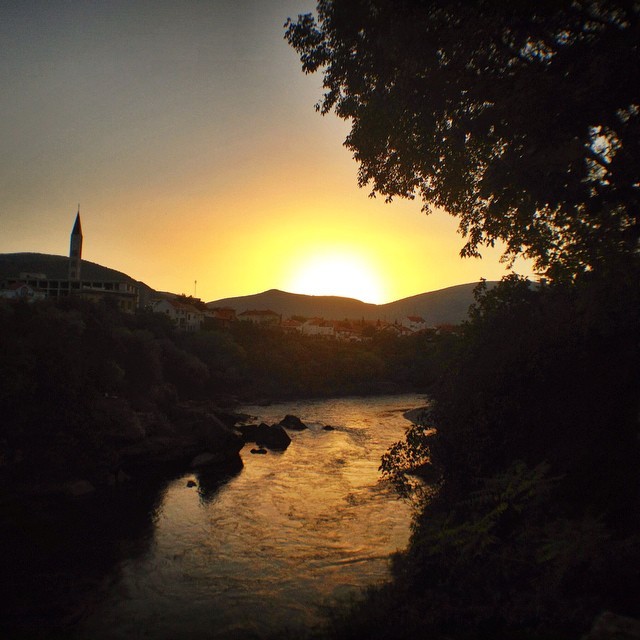
Outside the mosque is a garden area and fountain taps. You can also visit a lovely café, where you can relax with Turkish tea or coffee and watch the sunset. To be honest, I don’t remember the name of the café (I’m a bad travel blogger!), but it’s worth the visit. Especially if you need to cool off after the exhausting climb to the top of the minaret in hot weather.
5) Undertake some urban exploration and see all of the Mostar street art
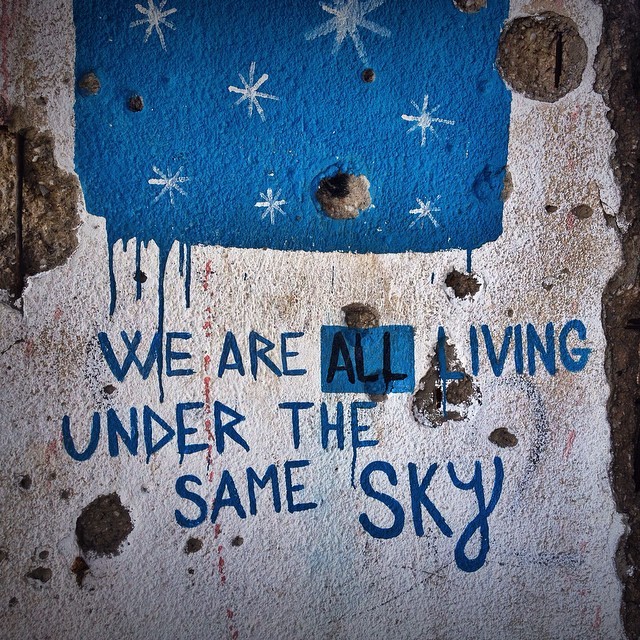

Another reason to visit Mostar, Bosnia and Herzegovina? The abundance of street art. If you’ve been reading this blog for some time, you’ll know that I’m totally obsessed with street art. Whether it be street art in Krakow, Amsterdam, or Cologne, I can walk around cities for hours on end taking it all in. I also think that street art offers visitors a unique and fascinating way to get to know a city’s culture and beliefs.
There’s no denying that the Bosnian War left its mark on Mostar. To this day, there are abandoned buildings riddled with bullet holes, left to decay and neglect. Although it’s heartbreaking, local young artists have done something quite extraordinary to turn this around. They use these buildings as a canvas to express themselves creatively and offer up messages of peace, criticism of wealth, and protest of past and even current oppression.
As I mentioned in a previous post on the subject, the street art in Mostar is quite touching and especially poignant. There’s an annual street art festival held each spring, where artists from all around the world come to Mostar to create new murals and other works of art.
6) Wander around the former Sniper Tower
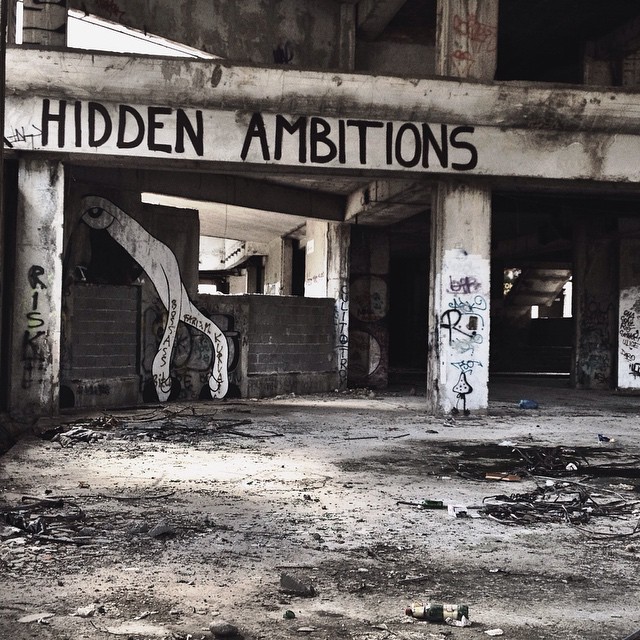
As Detroit has its share of abandoned buildings like the Packard Auto Plant and the Abundant Life Christian Church, so does Mostar. Some of the buildings that you can see are the Sniper Tower, Neretva Hotel, and an old airport hangar
The Sniper Tower in Mostar used to be a bank. Positioned along the frontline during the Bosnian War, the building was a base for snipers who would hide in the tower to aim at their targets below.
Today, the tower is decorated with street art and is a site for those looking to take part in less mainstream urban exploration activities. Although it’s not encouraged or exactly permitted, the building is fairly easy to enter – simply jump over the back wall (near the Nelson Mandela quote). You can explore its various floors, check out the street art, and take in another lovely view of Mostar from the top floor. Locals advise that the best time to enter is around sunset.
Some tips for the Sniper Tower in Mostar:
- Wear sneakers if you visit the Sniper Tower, as there’s a lot of debris and broken glass scattered throughout the building.
- Avoid visiting the Sniper Tower at night as there are homeless people who sleep there sometimes. Be nice, allow them a good night’s sleep, and leave them undisturbed.
7) Gaze at the Neretva Hotel from afar
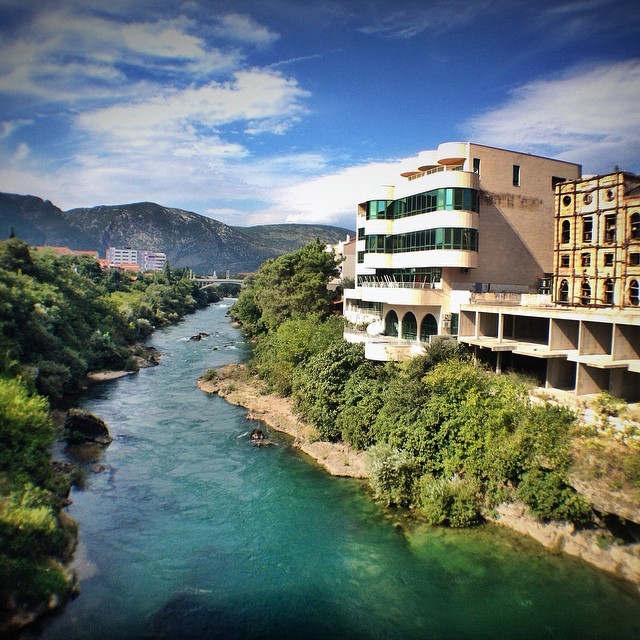
What used to be a grand and opulent hotel, nicknamed “Tito’s palace” as it was a favorite of Josip Broz Tito (the former leader of Yugoslavia), is now a building that sits in ruin. While you can’t enter, you can see it from different vantage points. The newly constructed building adjacent to the hotel provides a dark contrast of progress and … lack thereof in Mostar.
8) Walk through the old airport hangar
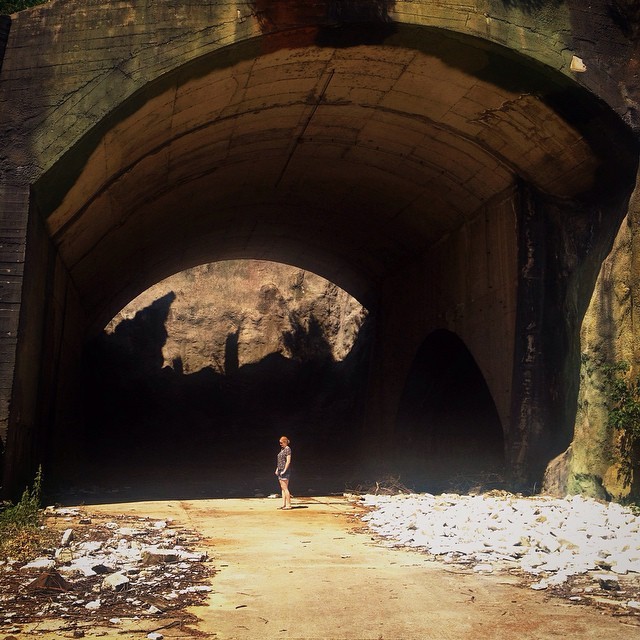
While in Mostar, I had a rare but delightful opportunity to visit a massive, formerly top-secret underground airport hangar disguised in the mountains near the Mostar airport. Here Tito stationed fighter planes that were hidden away from the eyes of the Soviets. The planes were always on the ready, should Yugoslavia ever come to be under attack.
You can now walk through the eerie space from one end to the other and there are even various rooms you can explore.
While I took an unofficial and independent tour with a local and a couple of new friends from my hostel, you can see this place by booking a tour with a huge number of local guides.
A few more tips about the abandoned airport hanger just outside of Mostar:
- If you manage to find your way to the airport hangar, bring a flashlight and a friend or two. It’s pitch black and not a place you want to enter alone.
- Some creatures thrive in the dark – beware of giant mutant spiders if you start exploring some of the smaller rooms in the hangar.
- As with the Sniper Tower, there is a lot of debris and broken glass found throughout the hangar. So again, wear sneakers.
9) Pose with the Bruce Lee statue
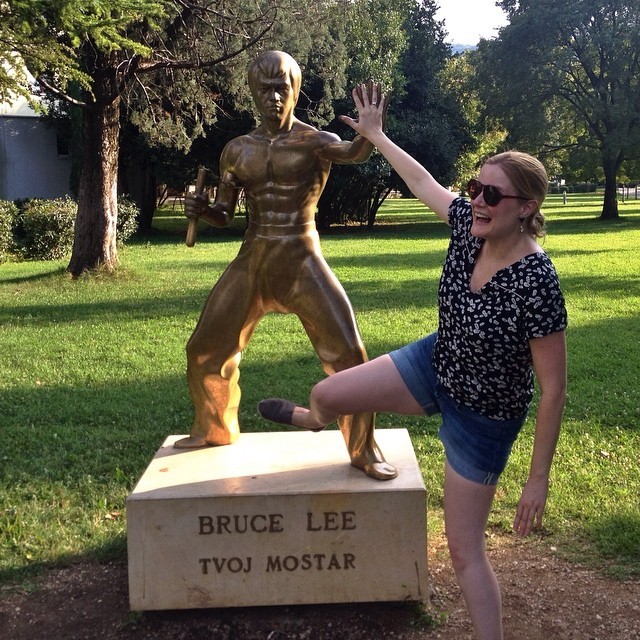
You’ll find this weird and offbeat statue of Bruce Lee in Zrinjevac Park. Standing at 1.68 meters high, this nearly life-sized tribute of the martial arts star is a curious site to find in Mostar.
Created by Croatian sculptor Ivan Fijolic in 2005, the statue was originally placed in the Spanish Square back in 2005. Intended to be a fun and lighthearted symbol of peace (it was thought that everyone liked Bruce Lee regardless of their ethnic background), some locals took a dislike to the statue and vandalized it shortly thereafter.
The statue was only put back in 2013 and has remained there ever since. Now tourists can go and take cheesy photos of themselves with Bruce Lee and pretend they’re engaging him in an epic martial arts fight sequence.
10) Head out of the city to Kravice Waterfalls
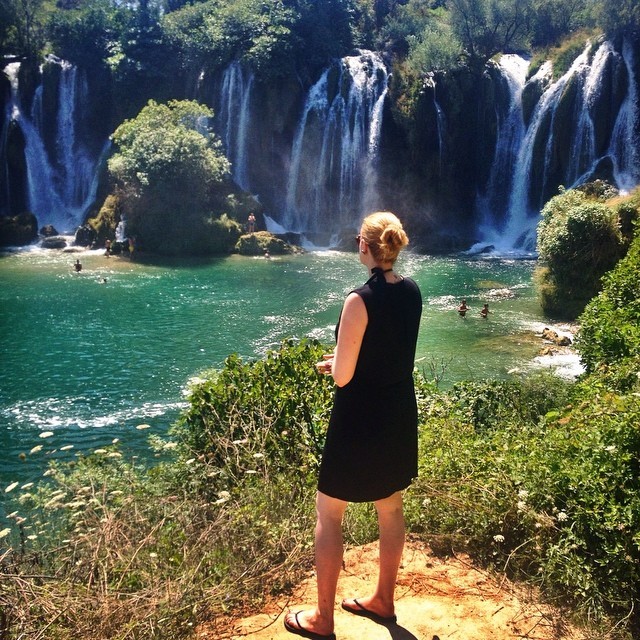
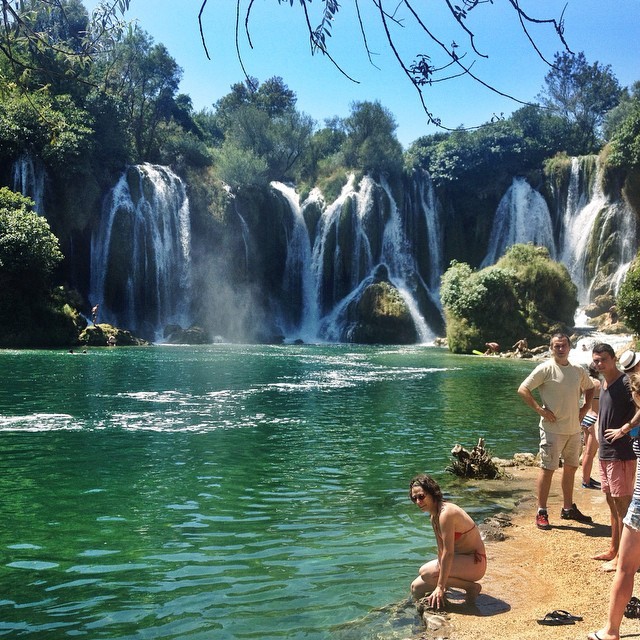
Just 40 km outside of Mostar, Kravice Waterfalls is the absolute perfect place to spend a summer day. Around 25 meters high, the waterfalls cascade into a stunning emerald-colored lake.
This little piece of paradise is not well known to tourists and is frequented mostly by locals. Swim in the lake and even under the waterfalls. You can even pass the time on a tire swing! There’s also a cafe where you can drink beer and take in some of the local specialties like cevapi.
After seeing Stari Most, Kravice Falls was the highlight of my trip to Bosnia. If you’re visiting Mostar, this is a must-visit.
Our top tips to visit Kravice Waterfalls like a pro:
- Even in the ultra-hot weather (it was around 35 degrees Celsius when I visited), the water was fairly cold. Dive right in and give yourself a few moments while your body adjusts to the change in temperature.
- While you can walk under the waterfalls and jump off some of the ledges into the water below, be extremely careful. A lot of people get injured this way. So just watch what others are doing or ask locals for advice.
- Check out stunning photos of Kravice Falls over at Kollecting Koordinates.
11) Visit Blagag Tekke By Day & Night
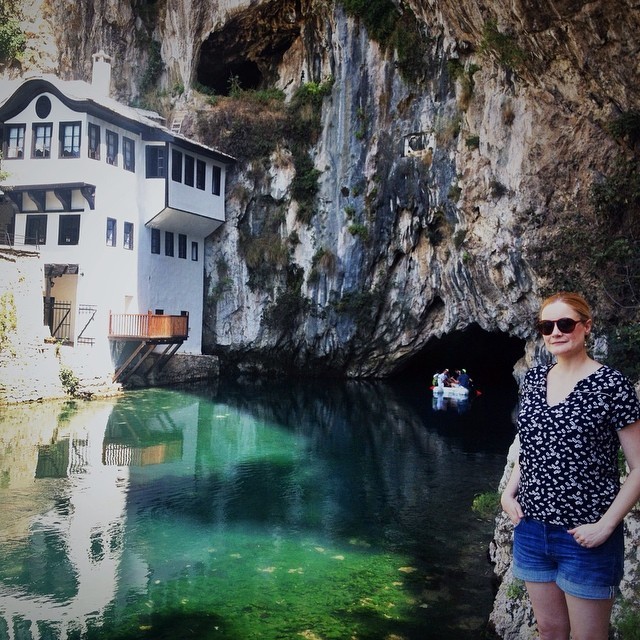
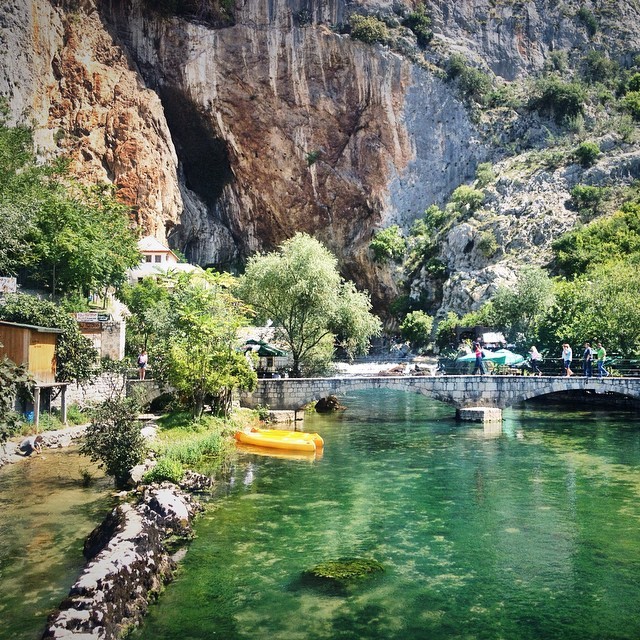
Blagag Tekke is considered to be one of Bosnia and Herzegovina’s most holy and ancient sites. Also known as the Dervish Monastery, the tekija was built to host gatherings of the Sufi Brotherhood. The stunning half-timbered tekija rests beside the fast-flowing blue-green Buna River, which spills out of a darkened cliff cave.
Erected around 1520, the tekija reflects the Ottoman and Mediterranean styles of architecture. The upper part of the building also houses two 15th-century Tajik dervishes. Miraculously, this mystical place remained untouched during the Bosnian war, despite so much death and destruction happening so close by. Only 12 km outside of Mostar, Blagaj Tekke continues to be popular with pilgrims and tourists alike.
How you can best experience Blagaj Tekke:
- Visit Blagaj Tekke at night when it’s much less crowded. Your experience will be all the more special and you’ll appreciate the solitude and opportunity for reflection.
- I came here first at night and then again during the day. For sure, it was worthwhile making the trip twice as there’s such a different atmosphere.
- For a small fee, you can take a boat into the cave.
- The best view of the tekija is from across the river. Follow the footpath behind Vrelo Restaurant.
12) Pay respect at Pocitelj, a sacred Bosnian Site
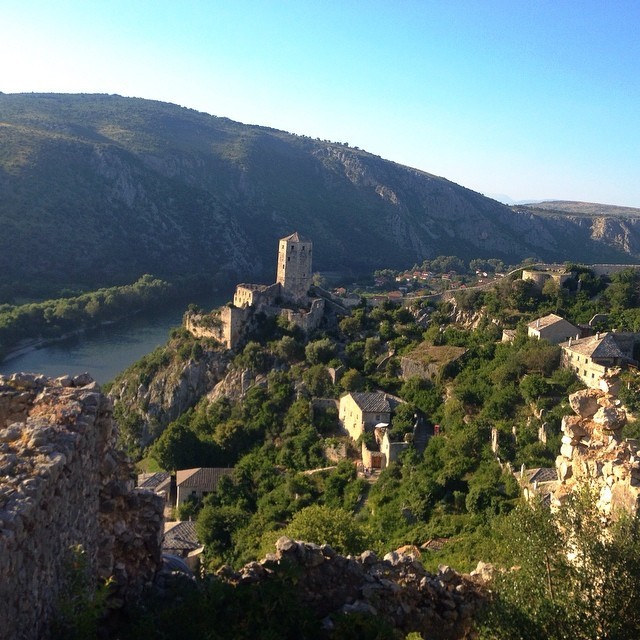
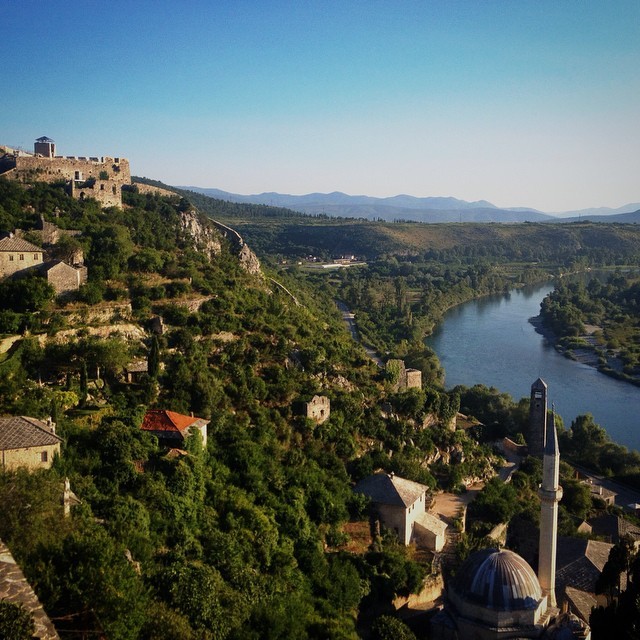
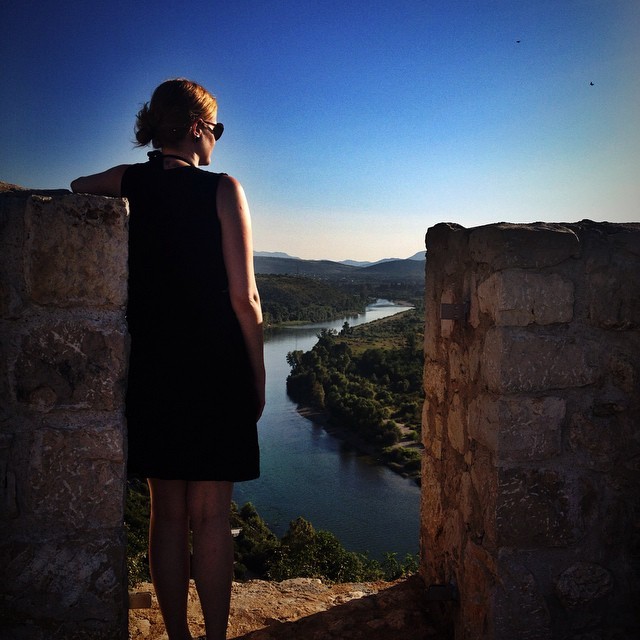
Resting on the left bank of the Neretva River, Pocitelj is a fortified medieval town that remains close to its original form. Just 30 km outside of Mostar, this is another site that begs to be seen. Established in 1383 by King Stjepan Tvrtko I, the walled town evolved through the 16th-18th centuries and showcases both Ottoman and medieval influences in its architecture.
Unlike Blagaj Tekke, Pocitelj was heavily damaged during the 1992-1996 Bosnian War by Croatian forces. Sadly, many great Islamic works of art and architecture were destroyed. Even more unfortunate was that most of the townsfolk were completely displaced.
Thankfully, in 1996 the World Monuments Watch named Pocitelj as one of the 100 most endangered cultural sites. Then in 2000, the government of Bosnia and Herzegovina finally placed the site under permanent protection. The protection is ongoing and focuses on the restoration of the town, continued preservation, and encouragement to the former population to return.
To this day, only a handful of people live in Pocitelj, and I feel fortunate to have met one of the locals. Through a tour I did with Hostel Majdas, our group was invited into her home to sample some delicious Bosnian food and drink.
Our top tips for Pocitelj include:
- Walk around and hike through the site for beautiful views of the town and surrounding areas. Climb the citadel for a truly incredible panorama.
- As it’s quite hot and there are no stores to buy drinks from, be sure to come equipped with water to keep yourself refreshed during your explorations.
13) Go to the Partisan Memorial Cemetery
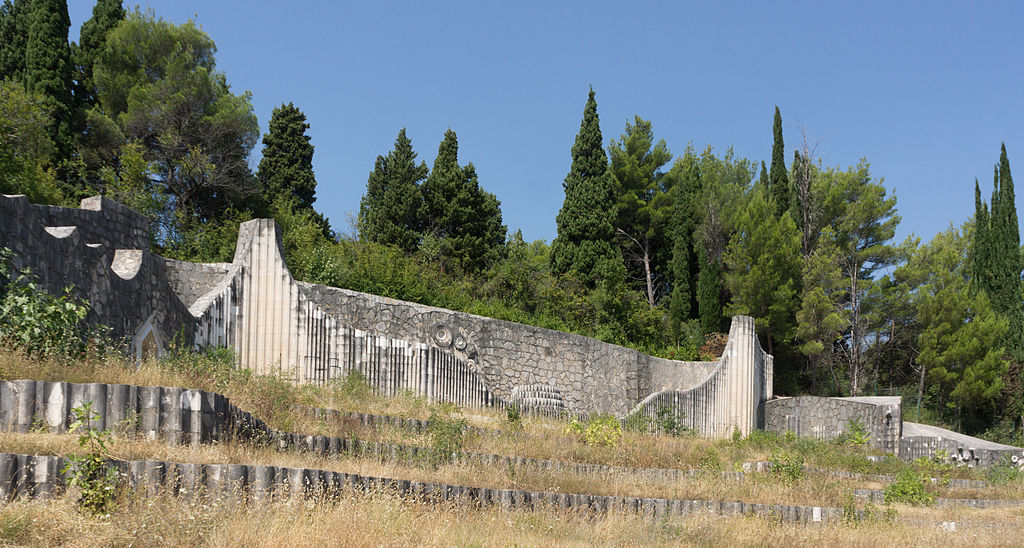
The Partisan Memorial Cemetery is another curious place to visit in Mostar. The memorial and cemetery were designed in 1965 by architect Bogdan Bogdanović to house the remains of 560 soldiers from Yugoslavia’s National Liberation Army killed during WWII. The cemetery features layered tiers, as well as tombstones in the shape of puzzle pieces. At the back of the cemetery is a massive wall with a centrally placed foundation set against the backdrop of some concrete artwork. There are several upward paths throughout the cemetery leading you through various canyons as well. Despite being such an intriguing historical site to visit, care of the cemetery has been neglected and it currently lies in ruins.
Recommended reading: If you like dark sites and quirky architectural finds, read this article about the Kyiv Crematorium.
Good To Know About Mostar
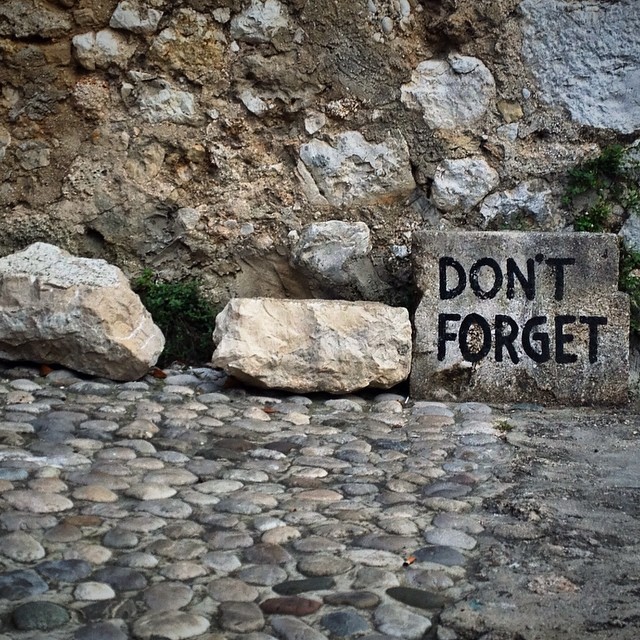
Have I convinced you to visit Mostar, Bosnia and Herzegovina? I hope that you’re already booking your flight and packing your bags.
1) If you need a place to stay in Mostar, find accommodation on booking.com.
Booking.com2) If you’re travelling to Mostar from other nearby cities and countries, consider booking a day trip with Get Your Guide.
3) If you like travel in Europe, consider giving some of our other posts a read:
- A Day Trip From Berlin to Visit Szczecin Poland – Why you should visit Szczecin Poland – from old castles to modern architecture, museums, & craft beer, learn how to spend the perfect day.
- The Hospital In The Rock Nuclear Bunker Museum – When in Budapest, visit The Hospital In The Rock Nuclear Bunker Museum to learn the history of this former top-secret location.
- Photos From A Snow-Filled Prague Castle Tour – Do something different and head to Prague during the winter season. Take in Christmas markets or better yet, take a snow-filled tour of the Prague Castle complex.
4) Or read this two week Balkan guide from the California Globetrotter.
*Disclosure – This post contains some affiliate links. If you book a tour or hotel, I’ll earn a tiny commission at no extra cost to you. Thanks for your support!


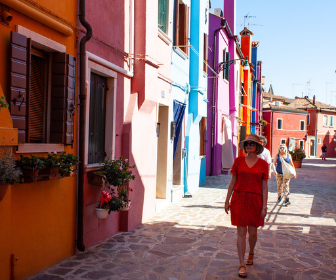
WOW! That is absolutely stunning and totally my kind of destination! Yes, you’ve totally convinced me and now my leisurely Sunday evening is going to be spent looking at flights to Mostar!
Arienne – you would love Mostar! And there’s so much more to do there than I mentioned.
I’ll look forward to any blog posts you may write or videos you may do on this awesome place. 🙂 🙂
Bosnia and Herzegovina are included on our list of travels for 2015. I’ve heard great things about this place and now I saw it thru your photos, I got more excited! You’ve got great pictures and the places you featured are all interesting. This will be helpful when I prepare my itinerary.
Thanks Vanessa! Hope you enjoy your time there. Love to hear what you think after you’ve visited too. 🙂
So glad I came across this post. We’ll be in Split, Croatia in April and it’s not far from Mostar. We’ll make sure to check it out, looks great.
Frank (bbqboy)
Yay, glad to hear Frank! Mostar will not disappoint you. 🙂
Glad you weren’t a crazy person and take the dive. The pics are stunning though! I did not spend nearly enough time in Bosnia and this makes me want to go back!
Hey Cristina –
Ha ha – I’m terrified of heights so diving off the bridge was never an option. Also, I’d likely belly flop. With my luck, someone would film it, put it on YouTube and I’d become an embarrassing viral sensation.
And thanks for your kind words! Perhaps we’ll travel there together someday. 🙂
Cheryl
Thanks for sharing this! I’ve wanted to go to Mostar ever since I went to Slovenia/Croatia and didn’t have time to dip into this beautiful country. I appreciate the tips — even though Stari Most is beautiful, I could never justify a trip for a pretty picture of a bridge. Sounds like there’s lots to do though!
Hey Becky –
Not a problem. Hope you will make it there at some point.
LOL – a pretty picture of a bridge is enough for me. It was an initial excuse and then set me on a challenge to find out what else was there. And as you can, I was not disappointed.
Cheryl
I’m going back to Bosnia and Herzegovina in 3 weeks and even if I’ve already been to Mostar you made me tempted to go back there, especially for the sniper tower and the street art! These totally sound like my kind of things!
Hey Kami – You should definitely go back. I’m definitely going again this year! There’s still so much more to see and do. 🙂
Cheryl
Oh, Cheryl. These photos are stunning! You are making me want to travel there right.now.
The bridge, the views, the waterfalls, the reservoir… just lovely.
Thanks so much Eliza! Mostar and Bosnia are just wonderful and I absolutely recommend a visit there ASAP. 🙂
Yes, I am in Mostar now and it’s beautiful really!
Hey Mike – I am so jealous of you right now! Hope you enjoy and say hi to Bruce Lee for me. 😉
I loved your write up! I hope it will encourage more people to visit Mostar and the rest of Bosnia 🙂
My husband is Bosnian, and every few years we go back to visit his family. It is really the highlight of my (relevant) year! It is such a beautiful little country with so much to offer. It’s natural surroundings is so breathtaking. And the cities and little towns are so quaint and pretty … it’s like stepping back in time! Bosnia will surprise you. You may end up falling in love with it 🙂
Thank you Ilham! So nice of you to say. 🙂
I cant wait to visit again – next time, I want to go to Sarajevo. Heard nothing but good things!
What a lovely post! I was fortunate enough to visit Mostar (just for a day though) a couple of years – took a day trip from Dubrovnik. It was a really hot day in August and the highlight was definitely Stari Most, and watching the divers as well. And it was surreal walking around the town and seeing abandoned buildings with bullet holes! Anyways, would love to go back and spend more time there someday. Your pictures are beautiful too 🙂
Very cool that you got to Mostar as well! You should definitely visit again sometime and see more of the area. 🙂
Brilliant blog and very useful tips for me too as I am going to Bosnia on Wednesday!
Cheers
Habib
Thanks Habib! Enjoy Bosnia. 🙂
Hi Cheryl,
great article, thanks! Bosnia is a hidden gem of Europe travels. We’ve been there twice and I made a 10 day travel plan for all the travellers searching for spare info about this lovely country: http://www.neretvarafting.com/travel-bosnia-trip-plan/
Enjoy Bosnia!
Tom
Thanks Tomas. I’m sure others will enjoy your tips as well.
Hi, Cheryl 🙂 After I've read your article about my hometown, I had need just to say thank you girl, for your pleasant words! Thanks for your recommendation for visiting Mostar. This is the only true way to represent what Mostar really is like. And not just Mostar, but whole BiH. Our nature, landscape, people and food…its all just worth visiting, indeed. Regards from Mostar 🙂 Majla
Hiya Majla –
You’re very welcome and your kind words mean a lot to me, so thank you.
I’ll be back to Bosnia again soon and see and do even more. Hoping to see some other parts of the country next time, like Sarajevo especially.
Best!
Cheryl xoxo
This was great, Cheryl. I’m traveling primarly to see Croatia, but want to make a detour to Mostar. Would two nights be enough? Should I rent a car from Dubrovnik, or did you manage without one? Where did you stay in Mostar? Thanks!
Hey Sharon,
Glad you enjoyed the article. 🙂 <3
I think two days should be sufficient but would recommend longer if you can. I managed without a car and took a bus directly from Split. You can also take local buses to reach places like the waterfalls.
I stayed at a hostel in Mostar called Hostel Majdas and it’s the BEST hostel that I’ve ever stayed in.
Hope this helps!
Best,
Cheryl
Just been in Mostar and Sarajevo. Beautiful places with a heartbreaking recent history. Mostar is fabulous. Even better at night when the tastefully lit minarets look wonderful. Restorant Hans is a great place to eat. Very good value, top notch food.
I’m heading back soon myself and can’t wait! Cool to know that someone else loves Mostar as much as I do. 🙂
I intend to visit Mostar with my Girlfriend in next summers, And for sure I am diving from satari most, It looks so great, Cant wait to see this beautiful creation of Ottoman empire.
That’s great! Enjoy your time there. I hope to get back soon myself. 🙂
Lovely article. I’m going to Montenegro in a couple of months and was considering a day trip to Mostar. It would be a 3 hour drive to get there, but your photos make it look worth it!
I was wondering if you learnt much of the language, or whether most people understand a bit of English? Also, if you happen to remember if there were any car parks near the attractions, or whether it’s quite a walk to get to each place? Not being lazy, just pushed for time! :-p
I did not know any of the language and found most people knew some English due to the amount of tourists. Don’t know about cars as I took a bus here. Enjoy Mostar!! 🙂
What an inspiring post! How did you get to Kravice Falls? I’ll be in Mostar in a few days and I would love to visit the falls.
Thanks! I went on a tour through my hostel. All the related info is in the post above. 🙂
Great post about my town! 🙂 Thank you!
If you would like to see something else another time.. Let me know.. 🙂 There are some places witch you can´t find tourist offices or with your hostel guide 😉
Especially if you like organic, domestic food and homegrown fruit and vegetables
Hi Mostarka –
Thank you for reading and you’re welcome! <3
When I return, which I will someday soon, I’ll definitely let you know. 🙂
Cheryl
Wow! Such an exhaustive post!
Bosnia is a beautiful place and yet so so underrated. I wish more people come forward and share their experiences as beautifully as you have done, Cheryl.
Great work 🙂 !
Hiya Prachi – Glad you liked the post. I definitely plan on some more travel to Bosnia more this year. I miss it so much …
In fact you have Cheryl, I've just booked for May! Thank you for these wonderful tips. I've added them to our itinerary.
Awesome Jody! Enjoy Mostar. 🙂
In 2016 we visit Bosnia; thanks for your tips
No problem Pol! Enjoy Bosnia. 🙂
very nice! i will visit soon, by car from timisoara, to sarajevo, mostar, dubrovnik and back.
BUT, if you travel by car, take care of your car insurance!
most of EU companies DON’T issue “green cards” valid for Bosnia and Herzegovina!!!
Hey Paul,
Hope you enjoy your visit! Thanks for the tip.
Cheryl
nice tips, they will come in handy! how many days did you stay in mostar?
Hey Matt –
Thanks. I was there for 4-5 days!
Cheryl
I was just there at the end of March and saw and experienced most, if not all, of what you photographed and talked about here. It is WONDERFUL and so interesting. And also tragic. My family and I had an incredible experience there. I am a photographer and it was a dream come true – this beautiful place.
Hey Cynthia!
Glad that you enjoyed Bosnia as much as I did. I only hope that more people will think to visit. 🙂
Cheryl
Oh my goodness! This is magical! I knew the Balkans was beautiful but I had no idea the region is beyond stunning and worlds apart from mainland Europe. This is going on my travel lust list for next year.
Hello Sheenie –
Thanks for reading. 🙂
I hope that you do make to Bosnia next year and discover just how magical it is there for yourself.
Best!
Cheryl
Hello Cheryl!!
Thank you for your blog!! Its very helpful! =)
I’m going to Mostar in Sep2016 and I would like to know how many days to you think we should stay there?Is it easy to go to the Kravica waterfalls and Pocitelj, did you go by bus?
Thank you very much!
Marcela
Hello Marcela,
Glad you liked the blog post and found it helpful. 🙂
It’s all about personal preference, but I’d say a minimum of 3 days is required so you really explore the city.
I went to Kravice and to Pocitelj as part of an organized tour with my hostel but believe that buses are available. I’d suggest getting more information from your hotel or hostel, or check with the local tourism board for proper up to date info.
Have TONS of fun there. 🙂
Hi Marcela,
be free to contact us while in MOstar for any free information!
Regards
Thanks for leaving your info! Sure, it will be helpful to our readers.
Best,
Cheryl
Hi, we will be visiting Kotor, Montenegro next month and are trying to decide between Shkoder, Albania or Most as a day trip…any thought s?? Grazie!!
Hey Laura –
I’ve visited Kotor but only on a day trip from Budva. As I love Mostar and have never visited Shkoder, I can only recommend Mostar! I’d also say that Mostar deserves so much more than a day of your time, as seen from all the reasons listed above. 🙂
Sorry that I could not help more.
Kind regards,
Cheryl
I will for sure go to Mostar this year. Since its not too far from Hvar. Im there almodt every year, but I nevrr took my time too leave the coast.
You inspired me, really!
Thanks
Simon
Hey Simon – Glad to hear! Enjoy your time in Mostar. 🙂
Best,
Cheryl
Funny ting…I’m from Mostar too – going Viking…
NICELY DONE!!!
Rafting on Neretva from Džajići by Konjic.
Prenj mountain is one of the Europe’s finest to climb.
Pitty that Mostar has 2 airports, both civil and military, not much in usedvanlig due to lokale politics.
Hi Vanja – Thanks for reading! And thanks for all of the other tips. 🙂
Any time!!!!
Many travellog have some suspicions and doubts about my homeland and it is a thriller to ready your poststed I found on People’som Choice Page.
For those who are not so fond of tropisk temps (rundt +40°C at the time) so travell in May or early june or september- oktober. Bytting/swimming season could be quite Long.
Hi Vanja! Can you give me the URL of the page where you found my article? That would be really cool. 🙂
We stumbled upon your article while looking for unique experiences in Bosnia and Herzegovina. Your list of places to see and things to do is a true inspiration to us!
Especially the exploration of the Airport Hangar would have been something we would have known earlier, while we were on our Bosnia trip ourselves. An alternative tip we will mark for our next visit!
We linked to your article in our own article (see below) because your selection of places and activities absolutely convinced us and will surely also appeal to our readers. 🙂
If you want to read which places we uncovered during our time in this remarkable country, we’re happy to share our article with you. Say hello, if you liked it 🙂
http://www.acoupleofcountries.com/2017/09/places-in-bosnia-herzegovina-which-will-uncover-the-truth-about-this-country/
Greets from Montenegro,
tina from A Couple Of Countries
Thanks for your comment and link Tina. I’m sure our readers here will also find your article useful. 🙂
Cheryl – thank you for your article, it’s always great to find something not on all the tourist listings. We really appreciated your tip re The Sniper Tower. All entrances are now completely blocked up but definitely worth a visit to appreciate the street art and the historic value.
The views from Koski Mehmet Pasa mosque definitely worth the climb. We managed to visit at c. 10am on a Saturday and there were less than six people in total. The Best views of Stari Most.
They appear to have started renovation on Neretva hotel.
Hiya Karen,
Thanks for reading the article! Thanks also for the update on some of the local sites as well.
– Cheryl
Hi Cheryl, I’m looking to visit Mostar in this december for a couple of days. It’s a good idea to visit the town like the first week of december or it’s just too cold and rainy?
Thanks.
It will prob be cold and wet! Average temperatures will be around 10 and it’s likely to rain. However, there won’t be as many tourists, so you’ll have the fun of experiencing the destination in low season, which is always a bonus. 🙂
I’ve lived in Mostar for many years, moved here to study and somehow stayed. This is a really good post, you showcased a lot of this city’s best points in this post.
Hey Ivana – Thanks so much for your comment. I really loved your city. <3
Absolutely stunning! Thank you on a detailed impressive guide!
Thank you so much for your kind comments.